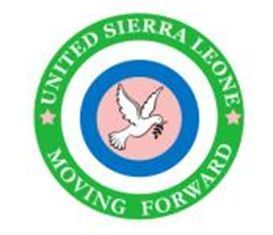The Music Industry and the Politics of Nations (“Yesterday Betteh Pass Tiday”)
Throughout history, music has not only co-existed with but has had direct links with the politics of nations. Colourful tones and powerful lyrics have been a catalyst for movements of social and political change. (Photo: Edward Tedson Sesay, Author)
The Greeks were among the first people to truly realise the potential power of music. Known for creating democracy and the republic, Greek intellectuals also understood how music could help move a society to rebel against their government. Plato argued that, “Music makes us better people” but he is also believed to have said that, “any musical innovation is full of danger to the whole state, and ought to be prohibited.” He warned that “when modes of music change, the fundamental laws of the state always change with them.” Â Rosseau, a French philosopher held that, “the emotional responses music draws from us act as a catalyst for our moral faculties.”
Certainly therefore, there is a clear link between music and the politics of nations. This brings me to the issue of the brouhaha generated in Sierra Leone and among Sierra Leoneans in the Diaspora by Emerson’s latest release, “Yesterday Betteh Pass Tiday.” A few articles have already been published on this issue and in many quarters, there is ongoing heated debate about Emerson being used by the currently sidelined SLPP Party to win them a few political points against the ruling APC.
A recently published article says that on 20 November, 2009, Sierra Leoneans in London carried out a successful boycott of an event at which Emmerson was going to launch his new album. The article further states that, Sierra Leoneans uttered statements such as, “we will teach him a lesson” and that “many believe the song was politically influenced to discredit the present government especially against the background of infrastructural development in the country since the coming into power of the APC government.”
If anyone wishes great accomplishments and glory for the APC, that person is me. In supporting my political party however, I refuse to be brought down to the level of a football fanatic who will detest any criticism leveled against his favourite club and who regards as an enemy any individual who utters a word he does not want to hear about his club. I believe that excellent performance in anything (politics included) is influenced to a great extent by those who are openly critical about us even if what they may be saying about us is baseless. Criticism wakens us up to see our areas of not so good performance. Even if we are doing very well, criticism helps us to know who our detractors are and it teaches us to be on our guard and push aside complacency.
I personally do not see Emmerson as an enemy of the APC in the payroll of the SLPP. In fact, he should be seen as an exceptionally patriotic Sierra Leonean. Going back to the period before the elections that catapulted the current government into power, Emmerson was very critical of the SLPP. How can we so quickly forget his great songs that went a long way at touching the thinking and judgement making faculties of the average Sierra Leonean? Not everybody agreed at the time with Emmerson and certainly, SLPP sympathizers at the time would hate his music. Emmerson sang his songs at the time and Sierra Leoneans listened and made their judgements and voted the APC in. Will I be right to say that Emmerson was at the time on the payroll of the APC and an enemy of the SLPP?
I personally and very genuinely do not believe that Sierra Leone has entered a worse period in its history compared to “yesterday”, but this will not tempt me to wish to crucify poor Emmerson and undermine his young, sprouting talent. I would love to see a Sierra Leone where our crop of musicians will enjoy the freedom to express their talents and views as long as they do not commit clear criminal offences.
In recent Ivory Coast history, popular music such as reggae and zouglou have served as a platform for the articulation of ideas about politicians, corruption, citizenship, national history and identity. Reggae, in Ivory Coast as in its country of origin Jamaica, has characteristically been associated with commentary on socio-political issues. Zouglou emerged in the 1990s in the context of student demonstrations for political liberalization and, along with reggae, served as a platform for the criticism of prevailing social and political conditions. Such popular music has been associated with the return to multi-party politics in that country.
In Jamaica, the late great Bob Marley whose music was a public expression of private truth came down heavily and hard on the governments of his country and on oppressive rule globally. Yet the then Prime Minister of Jamaica (Edward Seaga) attended his funeral, and his speech on the occasion was all about the great role as reformer that Bob played during his short life.
The late Dr Kwame Nkrumah of Ghana acknowledged the powerful and influential role that creative artistes such as musicians can play in the progress and development of a country. In this respect, he founded the Arts Council of Ghana to inspire and encourage creative artistes to lead the country to achieve progress and development.
I am sure the APC government is to a great extent on track in the delivery of election pledges, but there is nothing wrong in being receptive to any views that well wishers or detractors may hold and publicly say for this is the only way the APC can do a meaningful appraisal of its work. I am sure President Koroma himself enjoys Emmerson’s music and would love to see this young man continue to produce the brilliant vibes for us.
Sierra Leoneans should move into the 21st century and think progressively. We must learn to live with every brand of criticism. It makes us better in whatever we are engaged. Therefore let us refrain from doing things that will intimidate our young artistes and in the process, undermine and stifle their talents. I therefore wish to say to Emmerson, “sing on boy, sing!” and to President Koroma, “keep marching on as long as your conscience is clear that you are well meaning and giving your best.” Finally, it is only time (our next presidential elections) that will be the test to prove whether “Yesterday Betteh Pass Tiday.”
Edward Tedson Sesay – London, UKStay with Sierra Express Media, for your trusted place in news!
© 2009, https:. All rights reserved.






